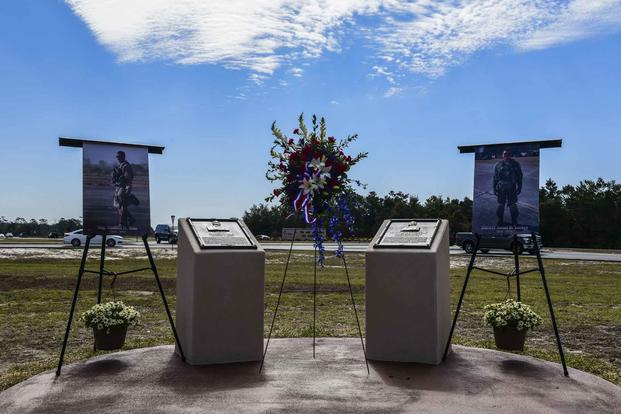
Nearly 14 years after an Air Force Osprey crashed near Qalat, Afghanistan, due to a mechanical issue, two airmen who died in the accident will be honored by the service.
Maj. Randell Voas and Senior Master Sgt. James Lackey will posthumously be awarded the Distinguished Flying Cross, Air Force Operations Command announced last week.
Investigators said an unknown mechanical malfunction occurred causing an emergency landing. Voas and Lackey’s actions on April 9, 2010, saved the lives of two other crew members and 14 other passengers on the Osprey, the service said. In addition to Voas and Lackey, an Army Ranger and a civilian contractor also died as a result of the crash.
The news of the awards comes as the service currently grapples with a deadly CV-22 crash that killed eight airmen off the coast of Japan late last year, and as the services struggle to find mechanical fixes for the Osprey.
Maddeline Voas, who was 16 when her father died and is now 30, said her family is grateful for the honor even though it invokes painful memories. She recalled being woken up when she heard her mother cry as news of her father’s death was delivered by military personnel.
“I think it’s going to feel really wonderful and just really fulfilling for our family for my dad to receive that,” Maddeline Voas said in a phone interview. “In the years since, I’ve heard so many stories from people that he flew with and about how much of an amazing pilot he was.”
Secretary of the Air Force Frank Kendall gave retroactive authority to the AFSOC commander, Lt. Gen. Tony Bauernfeind, to approve the award nominations, the service said in a press release last week.
“Randy and JB’s actions in the face of chaos is what all Air Commandos train for,” Bauernfeind said in a statement, referencing Voas and Lackey’s nicknames. “I am grateful that we are able to recognize their final acts.”
The announcement of the posthumous Distinguished Flying Cross awards for the two airmen comes two days before the Air Force announced plans to start putting its CV-22 fleet back in the air, following a three-month stand-down of the aircraft shortly following a deadly crash in November.
Rebecca Heyse, an AFSOC spokeswoman, told Military.com that the awards for Voas and Lackey were in the work prior to the November crash and that Bauernfeind received the authorization from Kendall in January to review the new award packages.
Voas and Lackey’s aircraft took off as the lead aircraft of a three-ship formation from a forward operating base on a 14-minute route to a landing zone near Qalat, according to an accident investigation report.
After hitting unexpected tailwinds, the crew changed its flight plan and ended up crashing roughly a quarter of a mile from the intended landing area.
The Osprey rolled on its landing gear across the sand, leaving “marks indicative of a nearly perfect roll-on landing,” the accident report detailed. The CV-22s nose gear collapsed and the nose section hit a ditch, causing the aircraft to flip tail over nose. Additionally, the left wing broke off and caught fire. The right wing and taiI section also separated from the fuselage, investigators detailed.
The Accident Investigation Board president could not determine the cause of the crash, citing a lack of “clear and convincing evidence” because the flight incident recorder, the Vibration Structural Life and Engine Diagnostics control unit, and the right engine were destroyed and couldn’t be examined, an Air Force news release detailed in 2010.
At the time, the Taliban claimed its forces had shot the Osprey down, but the Air Force ruled out “loss due to enemy action, environmental brownout conditions and vortex ring state,” the service said.
Heyse said new information came to light, prompting the awards.
“We received additional information last year that allowed us to pursue these decorations,” Heyse told Military.com. “It doesn’t change the conclusions of the [Accident Investigation Board] at all but shed light on the actions of Maj. Voas and SMSgt. Lackey during the mishap.”
The most recent crash off the coast of Japan on Nov. 29 killed all eight crew members aboard and triggered a grounding of all Air Force, Marine Corps and Navy V-22 Ospreys. Military officials announced last week that the Ospreys would be returning to flight, even though the investigation into November’s crash has not concluded. That investigation has revealed a new mechanical failure that is not fully understood — showcasing the second known, persistent mechanical issue that is plaguing the V-22.
The aircraft also has a yearslong problem with its complex system of clutch assemblies that have caused at least 15 mishaps — some of which could have become fatal — since the Osprey entered operations. That problem was revealed when the Air Force briefly grounded its fleet of Ospreys in the summer of 2022.
The Air Force special operations Osprey that went down Nov. 29, call sign Gundam 22, was on a training mission off Japan’s Yakushima Island.
The recent news of the November Osprey crash that left eight airmen dead was tough for Maddeline Voas. She remembers what it was like losing her dad, and she doesn’t want anyone else to experience that pain.
“Even though it’s been so long, it still feels like yesterday,” she told Military.com. “Anytime I see anything with, honestly, aircraft in general, the Osprey included, it is triggering. And I know what the families are going through, and I wish they didn’t have to feel the way that my family felt.”
Related: Ospreys Cleared to Fly Again After Deadly Crash Despite Mechanical Failure with Unknown Cause






